I still remember my first glimpse of Premnath in a different persona than the fat, balding, beetle-browed villain of so many ‘70s films.
This was in the mid-80s. My sister and I (I was then not even in my teens) were watching Chitrahaar, and Thandi hawaayein lehraake aayein came on. It was proceeding fine, with Nalini Jaywant flitting across the screen, when suddenly a strikingly handsome man, tall and broad-shouldered, sprang up by her side, danced with her, and then disappeared. Who was that? We asked each other, and couldn’t supply an answer. We turned to our father, our source of information for all things old Hindi cinema. Papa said that Naujawan starred Premnath. Who Premnath, we asked in disbelief. That paunchy and somewhat repellant man in Johnny Mera Naam?
It took a watching (incomplete, sadly, because the electricity went) of the 1951 film Sagaai to convince us that yes, Premnath was indeed quite a hottie in his heyday.
If you think so too (or if you haven’t seen Premnath in the early 50s, when he was paid more than Raj Kapoor and several other leading actors), you should watch Saqi.
Saqi begins in the Persian desert, not far from Baghdad. A caravan of merchants, headed for the capital city, is hailed by a passerby named Ajeeb (Premnath), who wants to join up with them, since he too is headed for Baghdad. And why is he going to Baghdad? To woo the beautiful Princess Rukhsana, whom he’s long been in love with—in his dreams.
Ajeeb and the merchants haven’t even started off together before Ajeeb gets diverted: he sees some suspicious activity nearby. Some men are congregating among the dunes, all bearing flaming torches. Ajeeb leaves the merchants to their own devices (they aren’t as curious as him, and would rather get to Baghdad than go shoving their noses into things which aren’t any of their business). When Ajeeb sneaks up on the group of men, he discovers this clandestine activity has reason to be clandestine: these guys are plotting the murder of the Sultan.
Their leader is Abdul (Iftekhar, looking very dashing). Abdul tells them that at court, the Wazir will drop his handkerchief, and that is the signal for the assassin to leap forward and plunge his dagger into the heart of the Sultan. Who will volunteer?
A man from amongst this bunch of traitors agrees, and is accepted. Abdul and his gang go their way, but Ajeeb’s presence is discovered (for some idiotic reason I cannot fathom, he goes out of his way to draw attention to himself, hooting and waving his arms at whoever’s following—not just at this stage, but throughout the story. Ajeeb, indeed). Somehow Ajeeb gives them the slip (by disguising himself as a dune)…
… and then sneaks into Baghdad, where he again draws Abdul’s attention to himself and is chased all over the city between the gates and the palace. Still obsessed with Rukhsana (and now with added reason to get to her), Ajeeb manages to make his way into the palace. Rukhsana isn’t in her chamber (she is already at court, seated next to her father, the Sultan), but one of her slaves, a mute dwarf named Tingoo, is. Ajeeb gives him a note to be passed on to Rukhsana at once. Since Ajeeb is much larger than Tingoo (and is very effective at intimidating the smaller man), the missive is duly delivered.
It’s to warn Rukhsana about the plot to assassinate her father the Sultan (Randhir). Rukhsana has never liked the Wazir (Bipin Gupta), and tries to draw her father’s attention to this warning, but the Sultan (who’s a scatterbrain) isn’t paying attention. Rukhsana, however, stays alert, and soon realizes where the attack’s going to come from—one of the two dancers who’re performing. The man is dancing with two daggers, one in each hand.
Therefore, when he lets fly with a dagger, Rukhsana quickly leaps forward and pushes Daddy out of the way. Meanwhile, the canny Wazir throws his dagger and stabs the foiled assassin in the back (a literal case of backstabbing?), thus killing him and destroying any chances of his revealing the mastermind behind the plot.
Rukhsana tries to alert her father to the Wazir’s treachery, but Daddy isn’t listening. He’s convinced that the Wazir only wants the Sultan’s well-being. Rukhsana, realizing her pleas are getting nowhere, decides she may as well go meet the man who sent her the warning. Thanks to Tingoo, this rendezvous is arranged at some ruins, where Rukhsana and her maid Jalwa (?) turn up, both disguised as men (badly disguised, too).
Ajeeb arrives, there’s some conversation (he doesn’t catch on to Rukhsana’s real identity), and they finally part on excellent terms, with Ajeeb promising to come and meet the princess.
… which he does, turning up in her bedroom, where they bill and coo, he talking to her as she (or so it appears) sleeps, she answering, supposedly, in her sleep. When she pretends to wake up, there are more starry-eyed promises of undying love.
This romantic rendezvous is first cut short by a song-and-dance, followed by the suspicious Wazir. With Abdul in tow, he comes barging in, looking for Ajeeb. Ajeeb manages to escape (how, it’s not very clear. But then, as the film progresses, you realize just how much is left unexplained in this story). Unfortunately for Ajeeb and his beloved, the Wazir is too wily for them. When Ajeeb, thinking the coast is now clear, is about to leave, the door opens with a bang—and there is the Wazir, along with his cohorts. Ajeeb is arrested and dragged away, Rukhsana screaming blue murder all the while.
She doesn’t waste time, though: she rushes off to her father, again trying to convince him of the Wazir’s nastiness. As she’s guessed, this isn’t any use, but it gets the Sultan worked up enough for him to not notice that Rukhsana has pinched his official seal.
Using this seal, Rukhsana creates a decree ordering the release of Ajeeb. She disguises herself and rushes off to the prison, where she’s able to fool the jailor into letting Ajeeb go.
And again, unfortunately, thanks to the Wazir’s suspicious nature (he’s discovered that the Sultan has lost his seal, and has put two and two together), Ajeeb is arrested again before Rukhsana can get him to safety.
This time, the Wazir is taking no chances. Ajeeb is thrown into a ‘man-eating pit’, a deep well down which lots of people seem to have been thrown. Ajeeb recovers consciousness to find himself surrounded by skeletons and skulls and whatnot.
He tries to climb out, but it’s impossible. Thankfully, girlfriend Rukhsana, all melancholy and convinced that poor Ajeeb is dead, chooses this moment to start singing in her palace, and Ajeeb joins in. Nothing like singing to help you forget your worries.
Ajeeb isn’t completely lost, though. As soon as the song is over and done with, a part of the wall falls in and an old gentleman appears. Ajeeb refers to him as a farishta (an angel), but it’s not very clear (again…) who this old gent is. At any rate, he tells Ajeeb that if Ajeeb goes thataway and manages to go past various obstacles, he’ll find a priceless treasure which will prove very useful.
The obstacles in question turn out to be nothing more than some flickering flames (there’s a path around them, so no big deal), two owls (huh? They only make eyes at Ajeeb, they don’t even peck at him) and a snake which coils lovingly about his shoulders. Our brave hero gets past all of these and to the treasure, a lamp. (You know what’s coming).
Yes. Ajeeb picks it up, absently rubs it—and a genie (Gope, disguised with some very interesting fake facial hair) emerges. The genie promises to be Ajeeb’s slave and do whatever he desires. For this, the genie also manages to perform some pretty formidable magic. He warns Ajeeb, though: do not let even a drop of water fall on the lamp. If that happens, Ajeeb will no longer command the genie of the lamp.
At Ajeeb’s command, the genie dresses Ajeeb in fancy togs (the genie too goes through a makeover). Now Ajeeb is the Shahzada-e-Hindustan, the Prince of Hindustan. And the genie is his Wazir. Accompanied by a retinue bearing trays loaded with priceless gifts (all courtesy the genie’s magic), they arrive at the court of the Sultan of Baghdad, Rukhsana’s father.
Here, the gifts the Shahzada-e-Hindustan bears dazzles the Sultan so much that he, sight unseen, promises to give, in return, whatever the Prince asks for. This makes the Wazir caution the Sultan: what if the Prince should ask for Rukhsana? But the Sultan pays no heed, and sure enough (naturally) that is what happens. The Sultan, to the Wazir’s horror, seems not at all upset by this proposed match, and happily gives his blessing.
All seems to be rosy for Ajeeb and Rukhsana (who is delighted to discover that her lover, far from being one of the skeletons in the pit, is alive and well and has obviously come up in life). But the Wazir, as we’ve seen before, is a suspicious man. Why does this Shahzada-e-Hindustan look exactly like that upstart who foiled their plan, he asks Abdul. There’s something fishy here.
Premnath acted in several period/fantasy films, such as Aab-e-Hayat, Baadal, and Aurat. There was something about those swashbucklers, with their splendid costumes, larger-than-life backdrops, and a mix of romance, adventure, and comedy that seemed to suit Premnath well. Saqi is one of these, though not in the same league as Aab-e-Hayat (which remains my favourite of all his early films).
What I liked about this film:
Premnath and Madhubala, so much eye candy. If for nothing else, watch Saqi for the gorgeousness of these two.
C Ramachandra’s music (he was assisted by Chic Chocolate in this film). Among my favourite songs here are Paas nahin aaiye, O haseena sambhal-sambhalke chalna (sung by C Ramachandra himself) and Ishq mein jo kuchh na hona thha.
And, Bipin Gupta. I have always seen Bipin Gupta in fairly predictable roles, as (mostly) the upper class, dhoti-clad gentleman: the patriarch, whether disapproving or benevolent, but rarely really nasty. As the ambitious and totally ruthless Wazir however, he has a meaty and substantial role, to which he does total justice. I don’t know if this is just Bipin Gupta’s skill as a thespian speaking, but it seemed to me as if he was really enjoying himself in Saqi.
What I didn’t like:
The not-too-good execution of the story. In essence, the story isn’t bad, but the problem lies in the way it’s handled. It meanders, it’s convoluted, and the comic romance between Rukshana’s maid Jalwa and the genie is just too long-drawn out for its usefulness to make sense. Also, the story is riddled with plot holes. How does Ajeeb escape the first time the Wazir finds him in Rukhsana’s bedroom? And several times after that, there are various instances of how and why being left unanswered.
Overall, a so-so film when it comes to plot and execution. Pleasant timepass, as we say, but don’t expect more.


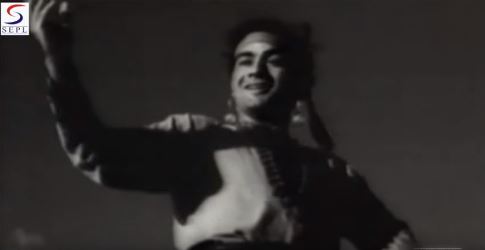
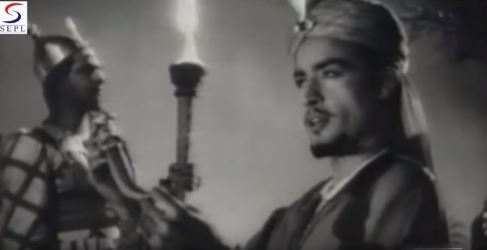
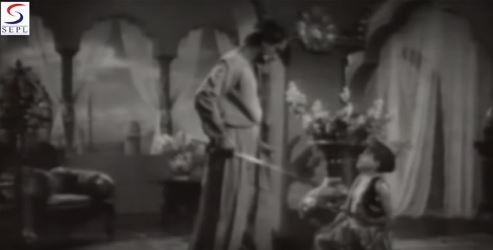
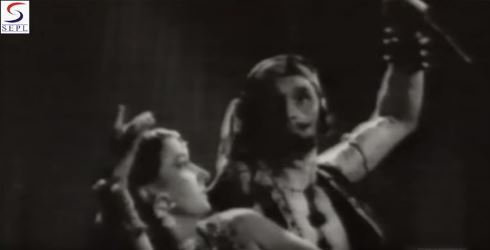
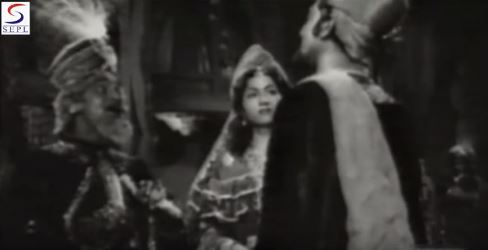
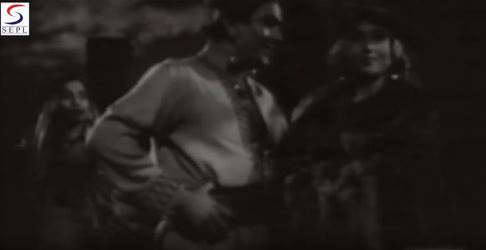
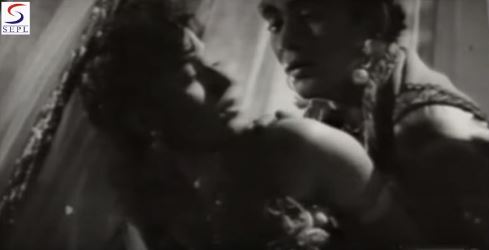
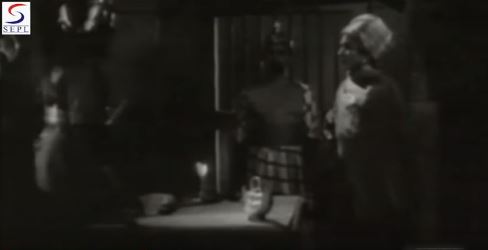
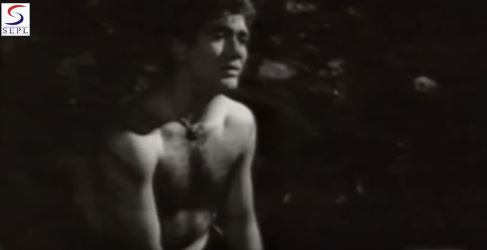



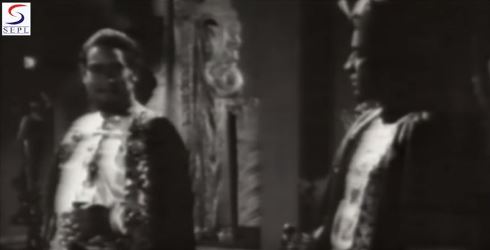

WHILE IT MAY NOT BE CONNECTED WITH HIS WORK AS AN ARTISTE , HIS BEHAVIOUR PARTICULARLY WITH ONE LEADING LADY OF THOSE DAYS, WHOM HE ASSAULTED, HAS LEFT A POOR IMPRESSION OF PREMANTH. HAD THE INCIDENT HAPPENED TODAY HE WOULD HAVE HAD TO GO TO JAIL
LikeLike
He used to regularly beat up Bina Rai.
LikeLike
He used to regularly beat up Bina Rai.
LikeLike
I didn’t know any of this. But then, the fact is I’m not interested in the gossip surrounding people. Any people.
LikeLike
Hi Dustedoff,
Long-time reader and a huge fan of your blog. I especially love it for its critical and progressive perspective towards films. Just wanted to gently point out that I really admire how you don’t engage with petty gossip about the personal lives of celebrities, and at the same time I do feel like assualt and abuse, while need to be spoken of consciously and with enough verification, are not the the same as gossip about inappropriate behaviour.
Why I feel like this distinction is important to make is because I also may not have an interest in the personal affairs of celebrities, but I do think that when we remember people from the past (or present) we can’t seperate the art from the artist. We don’t know how many other people who have been assualted continue to witness numerous articles celebrating artists, without any mention of the damage they have done, even after several years of reliable information being out there.
So while I don’t feel the need to mention this about him in the article itself, I do think that any kind of conversation on the violation of human rights is not the same as the gossiping about sordid personal affairs.
I hope I was able to explain myself clearly (always a challenge through the written medium). I really love and admire your work, and just wanted to share my opinion, which is personal and I recognise that others may not feel the same. I do wholeheartedly agree with the comments below that claims should be verified since they are serious, but until that verification happens, dismissing it as gossip may be diminishing the experiences of those who do experience different kinds of assualt in their own lives.
Thank you, and hope you’re staying safe.
LikeLike
“Just wanted to gently point out”
And yes, you were very gentle and polite about that! I wish more people could learn to be as civilized as you when expressing a difference of opinion.
I agree with what you say. Yes, of course there is a difference between mere salacious gossip about the personal lives of individuals and possible allegations of misbehaviour, crime, etc. I would never condone any such behaviour in even those I admire, so yes: definitely not clubbing an allegation of abuse with the ‘who-slept-with-whom’ sort of rubbish one hears flung around.
My main problem with the two comments at the top of the list of comments here was that they seemed completely arbitrary, if you know what I mean. Out of the blue, nothing to support the allegation, no explanation. (It seems to have struck one of them to explain later, following your comment, so that makes it better – because if this recent comment had been supplied in the first place, I wouldn’t have dismissed it as ‘gossip’, because there’s something here other than a vague accusation).
As much as I completely abhor violence or abuse in any form, I think it’s equally important to desist from making unvalidated accusations. Something just flung into the ether, nothing to support it, no explanations – that can be seriously harmful.
But thank you for that comment, and yes, I hope you’re safe, too! Stay well.
LikeLike
Thank you for such an empathetic reply. I do understand what you mean as well, and this reaches me another aspect to this kind of dialogue that I hadn’t thought of before. Thanks for engaging!
Best,
Ritika
LikeLike
*teaches 🙈
LikeLike
You’re welcome, and thank you for setting a fine example for how to disagree in a civilized way. I wish there were more people like you around.
LikeLike
I WANT TO CLARIFY THAT THE MATTER WAS EXTENSIVELY REPORTED IN ALL MAGAZINES COVERING MOVIES IN THOSE DAYS AND EVEN A RESPECTED TABLOID LIKE THE “BLITZ” . THE ASSAULT ALSO HAPPENED IN FULL VIEW OF MANY ARTISTES AND TECHNICIANS . ALL THAT I WANTED TO POINT OUT WAS HOW ATROCIOUS LATE PREMNATH’S PUBLIC BEHAVIOUR WAS ; HE LATER ON APOLOGIZED TO THE LADY AND ACKNOWLEDGED THAT SHE WAS LIKE A DAUGHTER TO HIM
LikeLike
Oh!
That’s an adaptation of Aladdin and the Magic lamp. Isn’t it?
Yesterday itself I (again) watched it, the Disney one, I mean. Will Smith as genie was superb.
I haven’t ever liked Premnath, somehow, he always looks like a villain. And seems conceited, too proud always.
Anyways, I can watch Saqi for Madhubala of course.
And ishq mein jo kuchh na is my absolute favourite. It’s heavenly.
:-)
LikeLike
You know, it’s been so long since I read (or watched) Aladdin and the Magic Lamp, I’ve forgotten pretty much everything about it, except for the genie. My daughter, of course (who loves the animated version) will probably be able to tell me if this is a good version. :-)
Madhubala is especially lovely in this film.
LikeLike
Oh!
I meant, the story of Saqi resembles Aladdin’s story.
Same it sounds.
Wazir trying to snatch away Kings crown, Aladdin gets the Magic lamp and helps.
I watched the Disney film on Sunday, 31st May, so the story was fresh in my mind.
LikeLike
Yes, I guessed that was what you meant – that the story of Saqi was similar to Aladdin. I meant it’s been so long since I read (or watched) Aladdin, I don’t remember that story any more. :-)
LikeLike
Saqi was fun, though I wager that some of the ‘Who, why, what, where, when’ could be answered by the DVD makers!
(And I also wish people wouldn’t post arbitrary gossip without any evidence whatsoever.)
LikeLike
“(And I also wish people wouldn’t post arbitrary gossip without any evidence whatsoever.)”
Come to my arms! :-)
LikeLike
Premnath had a very good second
Innings as Character Actor/ Villain. It
started with Teesri Manzil and continued
with Johny Mera Naam, Shor, Karz, etc.
I personally feel he was better in these
movies. As a hero he was handsome
but no match for, say, Dilip Kumar,
with whom he competed for the amour of
Madhubala!
Nitin
LikeLike
I’m glad you mentioned Shor – that’s not a film many people tend to remember Premnath for, but he was really good in it.
Talking of looks, one area in which Dilip Kumar certainly scored over Premnath was in the smile! Dilip Kumar had a dashing smile, Premnath’s was – as blog reader and former fellow blogger Harvey put it – a ‘goofy grin’!
LikeLike
And the nose! I love the shape of Dilip’s nose. I don’t mean to be insulting God’s creation but Premnath’s nose doesn’t look ‘indian’ to me. It’s quite wide which made his dashing looks to be queer in a sort of ways. Regarding the ‘gossips’ made about him, Rishi Kapoor described Premnath ‘as an angel who became a devil’ in his autobiography. I therefore guess in every gossip, there’s an atom of truth.
Kudos for giving a foreigner like me insights of old Hindi artistes and their films. I really appreciate that.
LikeLiked by 1 person
I agree, Dilip Kumar’s nose is nicer than Premnath’s! Premnath’s nose is certainly too wide – not to be Indian, I’d say, since there are many types of Indian features – but just to appeal to me.
I’m glad you find my blog useful. Thank you!
LikeLike
I found the movie hopelessly drab.Stuffed with ridiculous anecdotes it gets nauseating. MADHUBALA has been wasted. PREMNATH more Comic character than a hero.
LikeLike